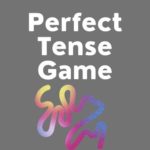משחק לימוד אנגלית-Perfect Tense Game

About this game
The game is divided into 3 parts. In the first part, you have to match simple verb forms to their perfect tense conjugations – for example, eat matches to eaten. The aim of this part is to review the verb forms before starting to make sentences and also to remind/cement the idea that perfect tense uses different verb forms. In the second part, you have to look at the image and click on the words to form an accurate perfect tense sentence – for example, ‘she has eaten lunch’. The aim here is to practice making accurate sentences and to test the students on word order and grammar issues. In the third part, you have to look at the image and click on one of 3 sentences. The 3 sentences here only have minor differences and the aim to give students practice in noticing correct grammar for perfect tense.
The sentences used in this game are arranged into 4 sets of content. These are grouped according to the different uses of perfect tense. The first set covers basic use of perfect tense to describe things that you have done at a non-specific point in time. For example, ‘she has eaten lunch’. Some life experiences are also included in this set, such as ‘seen an elephant’ and ‘graduated from college’. The aim with this set is to cover all the basic verbs and try to get phrases that people are likely to hear in everyday life, such as ‘done homework’ or ‘passed the test’. This set also varies between singular and plural and between positive and negative. The intention with this is to expose students to all the different forms that basic perfect tense phrases can take.
The second set of phrases concerns life experiences – sentences that would answer ‘have you ever x?’ questions. A contrast was created between sentences stating the number of times something has been done and sentences stating that something has never been done. This is important as the sentence order is different for ‘never’ phrases. The aim here is to expose learners to these kind of life experience phrases. I tried to use phrases that could be typically be experienced in everyday like – e.g. ‘had an injection’ or ‘failed the test’. But typically these sentences are unusual in nature, such as ‘eaten a spider’.
The third set concerns duration and how long you have done something for. This is one of the main uses of perfect tense – to describe an action that you continue to do from the past up until present, for example: ‘lived in London’ or ‘played the trumpet’. The key issue with these sentences is whether they are used with ‘for’ or ‘since’. If there is a specific time mentioned at which the action began, then ‘since’ is used. Whereas, if you just have a duration – e.g. ‘5 years’, then ‘for’ is used. This distinction is quite important and so it is important for students to get practice with sentences that contrast this.
The final set concerns phrases involving the words ‘just’, ‘already’ and ‘yet’. These signify slightly different meanings for perfect tense and so contrasting them is quite useful. Phrases with ‘yet’ are used for situations in which an action hasn’t taken place, but is likely to do so in the future – e.g. “the store hasn’t opened yet”. ‘Just’ phrases are used to describe events that have recently happened with evidence showing. For example, ‘he has just washed the car’ with the car showing as clean and the water and soap visible. Similarly, ‘already’ phrases describe events that have taken place. I chose to use ‘already’ for situations when there is evidence in the present. This means that there is a lot of overlap between the ‘just’ and ‘already’ phrases, but the options available for students to click on should preclude any confusion. The aim of this content is to practice making phrases using these words, with a particular focus on correct word order. I really think that practicing these phrases like this is useful for learners.





